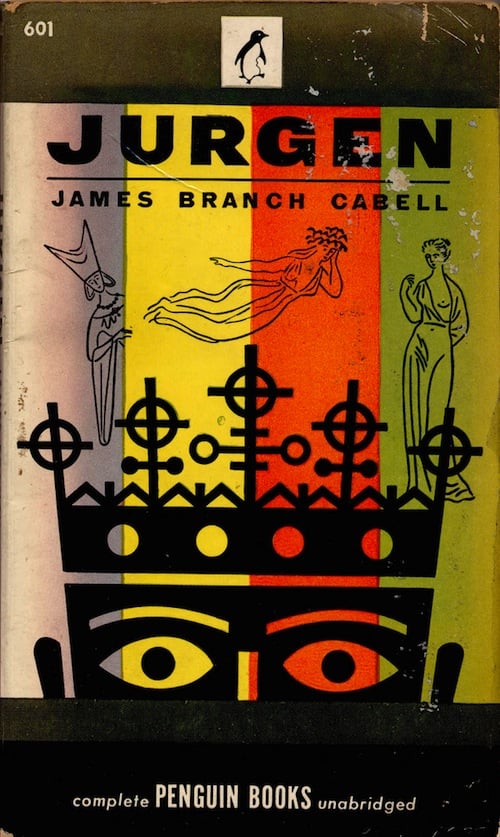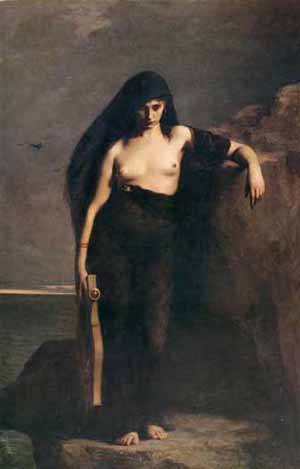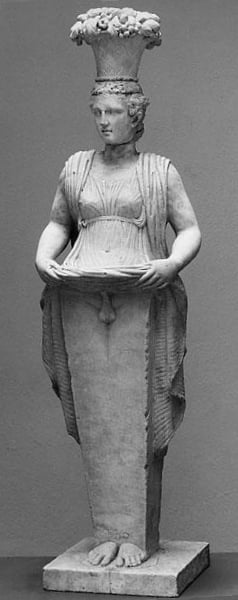Jurgen (47)
By:
February 5, 2016

James Branch Cabell’s 1919 ironic fantasy novel Jurgen, A Comedy of Justice, the protagonist of which seduces women everywhere he travels — including into Arthurian legend and Hell itself — is (according to Aleister Crowley) one of the “epoch-making masterpieces of philosophy.” Cabell’s sardonic inversion of romantic fantasy was postmodernist avant la lettre. HiLoBooks is pleased to serialize Jurgen here at HILOBROW. Enjoy!
And again Koshchei waved his hand. Then came to Jurgen a woman who was strangely gifted and perverse. Her dark eyes glittered: upon her head was a net-work of red coral, with branches radiating downward, and her tunic was of two colors, being shot with black and crimson curiously mingled.
And Anaïtis also had forgotten Jurgen, or else she did not recognize him in this man of forty and something: and again belief awoke in Jurgen’s heart that this was the only woman whom Jurgen had really loved, as he listened to Anaïtis and to her talk of marvelous things.

Of the lore of Thaïs she spoke, and of the schooling of Sappho, and of the secrets of Rhodopê, and of the mourning for Adonis: and the refrain of all her talking was not changed. “For we have but a little while to live, and none knows his fate thereafter. So that a man possesses nothing certainly save a brief loan of his own body: and yet the body of man is capable of much curious pleasure. As thus and thus,” says she. And the bright-colored pensive woman spoke with antique directness of matters that Jurgen, being no longer a scapegrace of twenty-one, found rather embarrassing.
“Come, come!” thinks he, “but it will never do to seem provincial. I believe that I am actually blushing.”

Aloud he said: “Sweetheart, there was — why, not a half-hour since! — a youth who sought quite zealously for the over-mastering frenzies you prattle about. But, candidly, he could not find the flesh whose touch would rouse insanity. The lad had opportunities, too, let me tell you! Hah, I recall with tenderness the glitter of eyes and hair, and the gay garments, and the soft voices of those fond foolish women, even now. But he went from one pair of lips to another, with an ardor that was always half-feigned, and with protestations which were conscious echoes of some romance or other. Such escapades were pleasant enough: but they were not very serious, after all. For these things concerned his body alone: and I am more than an edifice of viands reared by my teeth. To pretend that what my body does or endures is of importance seems rather silly nowadays. I prefer to regard it as a necessary beast of burden which I maintain, at considerable expense and trouble. So I shall make no more pother about it.”
But then again Queen Anaïtis spoke of marvelous things; and he listened, fair-mindedly; for the Queen spoke now of that which was hers to share with him.
“Well, I have heard,” says Jurgen, “that you have a notable residence in Cocaigne.”
“But that is only a little country place, to which I sometimes repair in summer, in order to live rustically. No, Jurgen, you must see my palaces. In Babylon I have a palace where many abide with cords about them and burn bran for perfume, while they await that thing which is to befall them. In Armenia I have a palace surrounded by vast gardens, where only strangers have the right to enter: they there receive a hospitality that is more than gallant. In Paphos I have a palace wherein is a little pyramid of white stone, very curious to see: but still more curious is the statue in my palace at Amathus, of a bearded woman, which displays other features that women do not possess. And in Alexandria I have a palace that is tended by thirty-six exceedingly wise and sacred persons, and wherein it is always night: and there folk seek for monstrous pleasures, even at the price of instant death, and win to both of these swiftly. Everywhere my palaces stand upon high places near the sea: so they are beheld from afar by those whom I hold dearest, my beautiful broad-chested mariners, who do not fear even me, but know that in my palaces they will find notable employment. For I must tell you of what is to be encountered within these places that are mine, and of how pleasantly we pass our time there.” Then she told him.

Now he listened more attentively than ever, and his eyes were narrowed, and his lips were lax and motionless and foolish-looking, and he was deeply interested. For Anaïtis had thought of some new diversions since their last meeting: and to Jurgen, even at forty and something, this queen’s voice was all a horrible and strange and lovely magic. “She really tempts very nicely, too,” he reflected, with a sort of pride in her.
Then Jurgen growled and shook himself, half angrily: and he tweaked the ear of Queen Anaïtis.
“Sweetheart,” says he, “you paint a glowing picture: but you are shrewd enough to borrow your pigments from the day-dreams of inexperience. What you prattle about is not at all as you describe it. You forget you are talking to a widely married man of varied experience. Moreover, I shudder to think of what might happen if Lisa were to walk in unexpectedly. And for the rest, all this to-do over nameless delights and unspeakable caresses and other anonymous antics seems rather naïve. My ears are beset by eloquent gray hairs which plead at closer quarters than does that fibbing little tongue of yours. And so be off with you!”
With that Queen Anaïtis smiled very cruelly, and she said: “Farewell to you, then Jurgen, for it is I that am leaving you forever. Henceforward you must fret away much sunlight by interminably shunning discomfort and by indulging tepid preferences. For I, and none but I, can waken that desire which uses all of a man, and so wastes nothing, even though it leave that favored man forever after like wan ashes in the sunlight. And with you I have no more concern, for it is I that am leaving you forever. Join with your graying fellows, then! and help them to affront the clean sane sunlight, by making guilds and laws and solemn phrases wherewith to rid the world of me. I, Anaïtis, laugh, and my heart is a wave in the sunlight. For there is no power like my power, and no living thing which can withstand my power; and those who deride me, as I well know, are but the dead dry husks that a wind moves, with hissing noises, while I harvest in open sunlight. For I am the desire that uses all of a man: and it is I that am leaving you forever.”
Said Jurgen: “I could not see all this in you, not quite all this, because of a shadow that followed me. Now it is too late, and this is a sorrowful thing which is happening. I am become as a puzzled ghost who furtively observes the doings of loud-voiced ruddy persons: and I am compact of weariness and apprehension, for I no longer discern what thing is I, nor what is my desire, and I fear that I am already dead. So farewell to you, Queen Anaïtis, for this, too, is a sorrowful thing and a very unfair thing that is happening.”
Thus he cried farewell to the Sun’s daughter. And all the colors of her loveliness flickered and merged into the likeness of a tall thin flame, that aspired; and then this flame was extinguished.
Footnotes from Notes on Jurgen (1928), by James P. Cover — with additional comments from the creators of this website; rewritten, in some instances, by HiLoBooks.
* Thaïs — Thaïs was an Athenian courtesan who induced Alexander to set fire to the palace of the Persian king at Persepolis. (There is no early support for this tale.)
* Sappho — Sappho, who lived at Lesbos in the seventh century B.C., is generally considered the greatest of woman poets. It is thought that she was homosexual and led a very licentious life.
* Rhodopê — Rhodopê was a celebrated Greek courtesan of Thracian origin, and a fellow slave of Æsop. She was loved by Sappho’s brother, and was the victim of a poem by Sappho.
* Babylon — Perhaps Anaïtis refers here to the sacred prostitution practiced in this city. Frazer (in The Golden Bough) says, “in Babylon every woman, whether rich or poor, had once in her life to submit to the embraces of a stranger at the temple of Mylitta, and to dedicate to the goddess the wages earned by this sanctified harlotry.”
* Armenia — Here was the shrine of Anaïtis herself, where she appeared under her own name, and not that of some other love goddess.
* Paphos — Paphos was the chief seat of the worship of Aphrodite, who was said to have landed at this place after her birth among the waves. The image of the goddess was a conical stone, which was anointed with oil at the time of worship.
* Amathus — Amathus, a town in Cypress, had a celebrated temple of Aphrodite. The Cyprian Aphrodite was two-sexed, and represented by the image of a bearded woman.
* Alexandria — In this city there was such a temple to Cotytto as is here described.
RADIUM AGE SCIENCE FICTION: “Radium Age” is HILOBROW’s name for the 1904–33 era, which saw the discovery of radioactivity, the revelation that matter itself is constantly in movement — a fitting metaphor for the first decades of the 20th century, during which old scientific, religious, political, and social certainties were shattered. This era also saw the publication of genre-shattering writing by Edgar Rice Burroughs, Sax Rohmer, E.E. “Doc” Smith, Jack London, Arthur Conan Doyle, Aldous Huxley, Olaf Stapledon, Karel Čapek, H.P. Lovecraft, Charlotte Perkins Gilman, Yevgeny Zamyatin, Philip Gordon Wylie, and other pioneers of post-Verne/Wells, pre-Golden Age “science fiction.” More info here.
READ GORGEOUS PAPERBACKS: HiLoBooks has reissued the following 10 obscure but amazing Radium Age science fiction novels in beautiful print editions: Jack London’s The Scarlet Plague, Rudyard Kipling’s With the Night Mail (and “As Easy as A.B.C.”), Arthur Conan Doyle’s The Poison Belt, H. Rider Haggard’s When the World Shook, Edward Shanks’ The People of the Ruins, William Hope Hodgson’s The Night Land, J.D. Beresford’s Goslings, E.V. Odle’s The Clockwork Man, Cicely Hamilton’s Theodore Savage, and Muriel Jaeger’s The Man with Six Senses. For more information, visit the HiLoBooks homepage.
SERIALIZED BY HILOBOOKS: Jack London’s The Scarlet Plague | Rudyard Kipling’s With the Night Mail (and “As Easy as A.B.C.”) | Arthur Conan Doyle’s The Poison Belt | H. Rider Haggard’s When the World Shook | Edward Shanks’ The People of the Ruins | William Hope Hodgson’s The Night Land | J.D. Beresford’s Goslings | E.V. Odle’s The Clockwork Man | Cicely Hamilton’s Theodore Savage | Muriel Jaeger’s The Man With Six Senses | Jack London’s “The Red One” | Philip Francis Nowlan’s Armageddon 2419 A.D. | Homer Eon Flint’s The Devolutionist | W.E.B. DuBois’s “The Comet” | Edgar Rice Burroughs’s The Moon Men | Charlotte Perkins Gilman’s Herland | Sax Rohmer’s “The Zayat Kiss” | Eimar O’Duffy’s King Goshawk and the Birds | Frances Hodgson Burnett’s The Lost Prince | Morley Roberts’s The Fugitives | Helen MacInnes’s The Unconquerable | Geoffrey Household’s Watcher in the Shadows | William Haggard’s The High Wire | Hammond Innes’s Air Bridge | James Branch Cabell’s Jurgen | John Buchan’s “No Man’s Land” | John Russell’s “The Fourth Man” | E.M. Forster’s “The Machine Stops” | John Buchan’s Huntingtower | Arthur Conan Doyle’s When the World Screamed | Victor Bridges’ A Rogue By Compulsion | Jack London’s The Iron Heel | H. De Vere Stacpoole’s The Man Who Lost Himself | P.G. Wodehouse’s Leave It to Psmith | Richard Connell’s “The Most Dangerous Game” | Houdini and Lovecraft’s “Imprisoned with the Pharaohs” | Arthur Conan Doyle’s “The Sussex Vampire.”
ORIGINAL FICTION: HILOBROW has serialized three novels: James Parker’s The Ballad of Cocky The Fox (“a proof-of-concept that serialization can work on the Internet” — The Atlantic); Karinne Keithley Syers’s Linda Linda Linda (which includes original music); and Robert Waldron’s roman à clef The School on the Fens. We also publish original stories and comics. These include: Matthew Battles’s stories “Gita Nova“, “Makes the Man,” “Imago,” “Camera Lucida,” “A Simple Message”, “Children of the Volcano”, “The Gnomon”, “Billable Memories”, “For Provisional Description of Superficial Features”, “The Dogs in the Trees”, “The Sovereignties of Invention”, and “Survivor: The Island of Dr. Moreau”; several of these later appeared in the collection The Sovereignties of Invention | Peggy Nelson’s “Mood Indigo“, “Top Kill Fail“, and “Mercerism” | Annalee Newitz’s “The Great Oxygen Race” | Flourish Klink’s Star Trek fanfic “Conference Comms” | Charlie Mitchell’s “A Fantasy Land” | Charlie Mitchell’s “Sentinels” | Joshua Glenn’s “The Lawless One”, and the mashup story “Zarathustra vs. Swamp Thing” | Adam McGovern and Paolo Leandri’s Idoru Jones comics | John Holbo’s “Sugarplum Squeampunk” | “Another Corporate Death” (1) and “Another Corporate Death” (2) by Mike Fleisch | Kathryn Kuitenbrouwer and Frank Fiorentino’s graphic novel “The Song of Otto” (excerpt) | John Holbo’s graphic novel On Beyond Zarathustra (excerpt) | “Manoj” and “Josh” by Vijay Balakrishnan | “Verge” by Chris Rossi, and his audio novel Low Priority Hero | EPIC WINS: THE ILIAD (1.408-415) by Flourish Klink | EPIC WINS: THE KALEVALA (3.1-278) by James Parker | EPIC WINS: THE ARGONAUTICA (2.815-834) by Joshua Glenn | EPIC WINS: THE MYTH OF THE ELK by Matthew Battles | TROUBLED SUPERHUMAN CONTEST: Charles Pappas, “The Law” | CATASTROPHE CONTEST: Timothy Raymond, “Hem and the Flood” | TELEPATHY CONTEST: Rachel Ellis Adams, “Fatima, Can You Hear Me?” | OIL SPILL CONTEST: A.E. Smith, “Sound Thinking | LITTLE NEMO CAPTION CONTEST: Joe Lyons, “Necronomicon” | SPOOKY-KOOKY CONTEST: Tucker Cummings, “Well Marbled” | INVENT-A-HERO CONTEST: TG Gibbon, “The Firefly” | FANFICTION CONTEST: Lyette Mercier’s “Sex and the Single Superhero”
